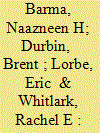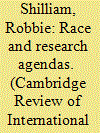| Srl | Item |
| 1 |
ID:
145733


|
|
|
|
|
| Summary/Abstract |
A crucial dimension of bridging the gap between international affairs scholarship and policymaking is the generation of substantive, policy-relevant research programs. We describe the use of scenario analysis as a valuable experiential and problem-based technique for developing innovative research ideas in political science. We focus especially on the scholarly and pedagogical potential of scenarios for doctoral students by describing the structured use of scenarios at the annual New Era Foreign Policy Conference. The features of scenario analysis that commend its use to policymakers also make it well suited to helping political scientists generate policy-relevant research programs. Scenarios are plausible and textured stories that help imagine how the future political-economic world could be different from the past in a manner that highlights policy challenges. Scenario analysis can throw into sharp relief overlooked, yet pressing questions in international affairs that demand focused investigation. In turn, the search for answers can shape important research programs geared toward providing actionable clarity in understanding contemporary global issues and challenges.
|
|
|
|
|
|
|
|
|
|
|
|
|
|
|
|
| 2 |
ID:
137165


|
|
|
| 3 |
ID:
120451


|
|
|
|
|
| Publication |
2013.
|
| Summary/Abstract |
In this afterword I consider a set of questions related to the research agendas of race in International Relations. What are our narratives of race and racism? Whom do we follow in order to tell the tale: the masters or the enslaved-the humanitarians or the 'sufferers'? And which tale confesses the episteme-the scientifically valid study-of race?
|
|
|
|
|
|
|
|
|
|
|
|
|
|
|
|
| 4 |
ID:
144883


|
|
|
|
|
| Summary/Abstract |
In “Key Issues and Research Agendas in Lone Wolf Terrorism,” published in Issue 3 of 2015, Ramón Spaaij and Mark S. Hamm (hereafter SH) mount an extended critique of the field of lone wolf terrorism studies, arguing that it suffers from significant definitional, methodological, and inferential issues. They are particularly critical of my article, “Explaining Lone Wolf Target Selection in the United States,” arguing that it “brings into sharp relief a number of key issues regarding the quality and rigor of lone wolf terrorism research.” This article, which analyzed a database of 84 lone wolf attacks that took place in the United States between 1940 and 2012, had three main findings regarding the process by which American lone wolves choose targets: (1) that lone wolves are constrained by their relative weakness compared to violent organizations, and must thus select “softer,” usually civilian targets; (2) that this relative weakness also drives them to use firearms, mainly, as the weapon of choice; and (3) that lone wolves choose targets at the intersection of their daily routines—for example, the route they take to and from work—and the ideology that they claim drives their behavior. For example, antigovernment lone wolves tend to select targets symbolic of government—monuments, courthouses, and so on—that are located in familiar areas. SH do not, in general, dispute these findings, but rather call into question the validity of some of the methods and approaches used to arrive at them.
|
|
|
|
|
|
|
|
|
|
|
|
|
|
|
|